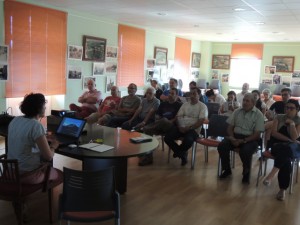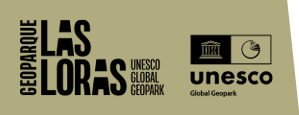Background
The Geopark Project started being developed in 2004 by two associations and a local council from two municipalities in the territory, supported by País Románico local action group. This bottom-up project has kept growing and developing in the same way. Las Loras Geological Reserve Association – Argeol – was created in 2006, with the aim of giving the Project legal support and leadership. A large number of local associations are represented by Argeol (Villaescusa de las Torre Local Council, Amigos de Revilla de Pomar Association, ACETRE Association, ADEMPA Association, CLIC Association, Burgos Geoscientific Association, ACECMAPA-Espacio Tangente Association, ADECO Camino de Santiago Local Development Group, País Románico Association, Heritage Interpretation Association). Argeol has been responsible for the Project development and all the activities which have been carried out over the years. This entity is formed by a multidisciplinary technical team of geologists, biologists and rural development and tourism technicians, responsible for planning the yearly programme, developing the necessary equipment and carrying out the activities. Argeol headed Las Loras application for becoming a member of the Geoparks Network.
Synergies and collaborations from local, provincial and regional entities and also from private entities and enterprises were sought in order to reinforce the management organisation and social participation and to ensure budgetary stability and maximum institutional support:
- Signing of Agreements with the three Local Action Groups within the territory (Adeco Camino, ACD Montaña Palentina and Páramos y Valles).
- Signing of Collaboration Agreements with Burgos and Palencia Provincial Councils.
- Collaboration Protocol with the General Directorate of Natural Environment and the Council for Culture and Tourism of Castile and Leon Regional Government.
- Collaboration Protocols with the Universities of Valladolid and Burgos.
- In 2004, at the beginning of the Project, the Scientific Committee was created as an advisory body with a multidisciplinary group of significant experts.
- Collaboration with public and private entities, as well as local enterprises and associations.
- Activities: training courses, publication of materials, Volunteer work, environmental education programmes, geological week, talks, geolodays, landscape workshops, sector roundtables, conferences, etc.
- Volunteerism: the extensive experience of the Project enabled a Volunteer Group, “Friends of Las Loras Geopark Project”, which actively collaborates in all activities.
Organización
There are several commissions:
1. Executive committee
| Entity | Representative |
|---|---|
| Ministry of Development and Environment of the Regional Government. | 2 representatives, Directors of the Natural Protected Areas. |
| Ministry of Culture and Tourism of the Regional Government | 2 Regional Delegates |
| Council of Burgos | Council President |
| council ofPalencia | Council President |
| Scientific Committee | 1 representative |
| Minucipalities working group
Local Action Gropus Assotiations and foundations Working group |
2 representative, one for each province1 representative for each LAG
1 representative |
| ARGEOL | 1 Management director and 1 Scientific director |
Formed by the representatives of each of the provincial and regional administrations present in the territory, two representatives of ARGEOL (scientific director and geopark manager), the coordinator of the scientific advisory committee and two representatives of the socioeconomic advisory committee. This commission met for the first time on November 3, 2015.
Funtions:
- The ARGEOL association is responsible for designing and developing the activities programmed in the Action Plan. This Plan may be modified by the Executive Commission and must be approved by the same prior to its execution.
- ARGEOL represents the Geopark in all the activities and events of the Geoparks Network operation.
- In biannual alternation, the representatives of the Provincial Councils of Burgos and Palencia will be in charge of the institutional representation of the Geopark.
- Approve the annual report of activities (Action Plan) and results, proposing measures to correct dysfunctions or improve management.
- Coordinate the different actions that each administration is going to carry out in the territory to unite efforts and optimize resources.
- Provide the Geopark with a reference body to facilitate the active participation of the inhabitants of the territory and channel the citizen initiative in the promotion and conservation of the Geopark.
- Promote the coordination of the public and private sectors.
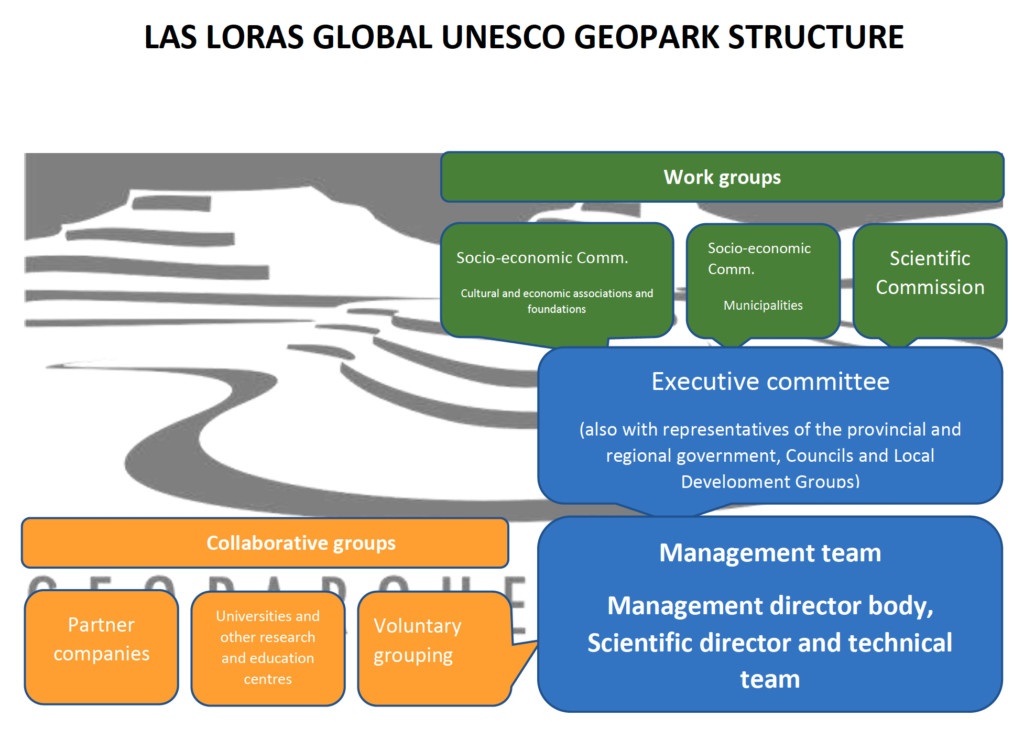
2. Scientific Committee
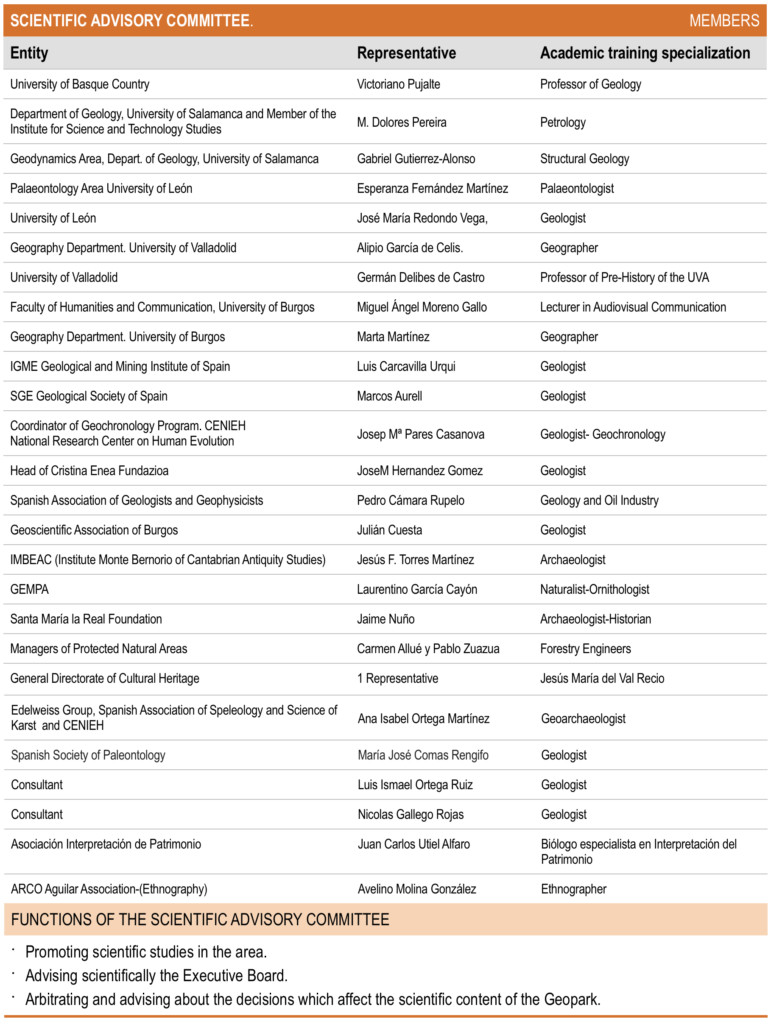
Formed by a team of researchers linked to the territory of the Geopark, mostly geologists. A large part of this team was formed in 2004 in the expert consultation session held in Revilla de Pomar. Later, new researchers have been incorporated. It is directed by the Scientific Coordinator, who will be the representative of this Committee in the Executive Commission.
Functions:
- Promote scientific studies in the area.
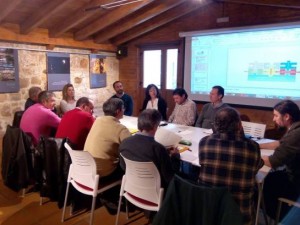
- Scientific advice to the Executive Commission
- To arbitrate and advise on decisions that affect the scientific content of the Geopark.
3. Socioeconomic Committee
| Municipalities Working group | |
|---|---|
| 16 municipalities: represented by their mayors | |
| Associations and foundations working group | |
| 33 Associations and foundations represented by their presidents | |
Functions:
- Compile all the improvement actions and concerns of the local population, regarding the Geopark, so that they can be transferred to the Executive Commission and can thus appear in the Geopark Action Plan
- Represent local businesses.
- Provide guidance on the distribution and priority of actions.
- Collaborate in the promotion of geotourism and the actions carried out in the Geopark
- Promote business training related to geotourism and geoconservation.
